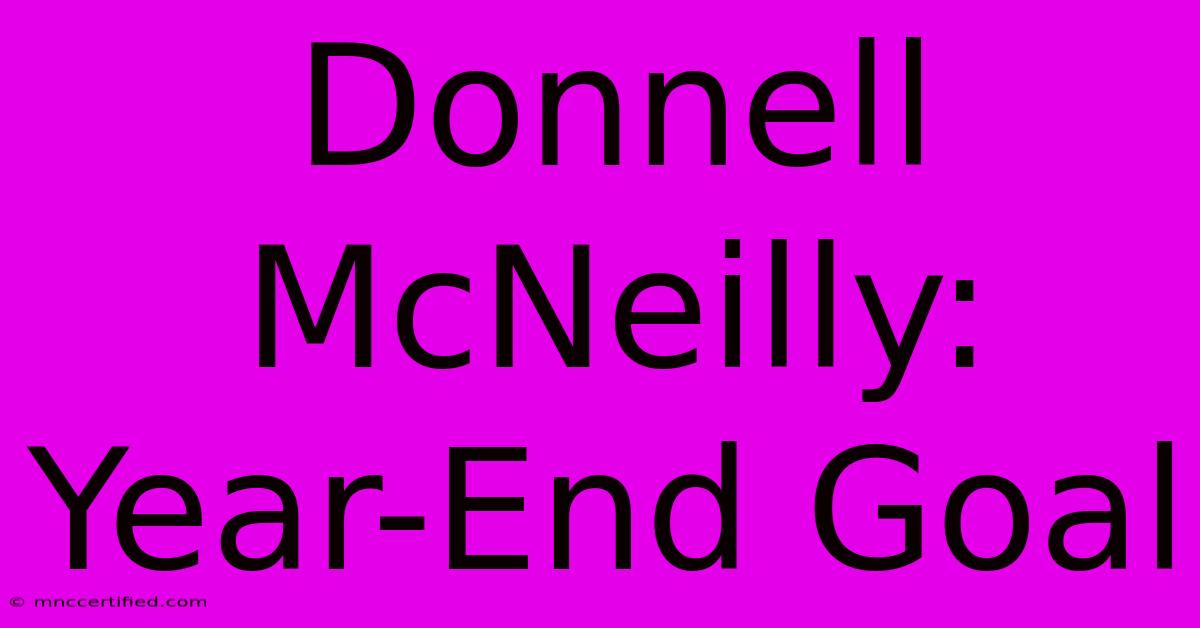Donnell McNeilly: Year-End Goal

Table of Contents
Donnell McNeilly: Year-End Goal Setting for Success
Donnell McNeilly, a name perhaps unfamiliar to many, represents the ambition and drive found in countless individuals striving for personal and professional growth. This article explores the power of year-end goal setting, using Donnell McNeilly (as a hypothetical example) to illustrate effective strategies and techniques. While we don’t have specific details about a real Donnell McNeilly’s goals, we can create a compelling narrative highlighting best practices.
Understanding the Importance of Year-End Goal Setting
Year-end goal setting isn't just about making a list; it's about strategic planning for the upcoming year. It allows you to reflect on past successes and failures, identify areas for improvement, and proactively shape your future. For someone like our hypothetical Donnell McNeilly, this process could be the key to unlocking significant achievements.
This process offers several key benefits:
- Increased Productivity: Clear goals provide direction and motivation, leading to increased productivity and a sense of accomplishment.
- Improved Focus: By prioritizing specific objectives, you eliminate distractions and concentrate your efforts on what truly matters.
- Enhanced Self-Awareness: Reflecting on the past year reveals strengths and weaknesses, paving the way for self-improvement.
- Greater Accountability: Written goals serve as a constant reminder of your commitments, fostering accountability and responsibility.
Donnell McNeilly's Hypothetical Year-End Goal Setting Process
Let's imagine Donnell McNeilly is a marketing professional aiming for career advancement. His year-end goal-setting process might look like this:
1. Reflection and Review (November/December): Donnell spends time reviewing his performance throughout the year. He analyzes completed projects, identifies successful strategies, and acknowledges areas where he fell short. This honest self-assessment is crucial.
2. Identifying Key Areas for Improvement (December): Based on his review, Donnell pinpoints areas needing attention. Perhaps he needs to improve his public speaking skills or enhance his knowledge of a specific marketing tool. This becomes the foundation for his goals.
3. Setting SMART Goals (January): Donnell sets Specific, Measurable, Achievable, Relevant, and Time-bound (SMART) goals. For example:
- Specific: "Complete a public speaking course and deliver a successful presentation at the company conference in June."
- Measurable: "Increase my social media engagement by 25% by December 31st."
- Achievable: "Learn the basics of SEO and implement them on three client websites by August."
- Relevant: "Obtain a professional certification in digital marketing to enhance my career prospects."
- Time-bound: "Secure a promotion to Senior Marketing Manager by the end of the year."
4. Creating an Action Plan (January): Donnell breaks down each SMART goal into smaller, manageable tasks with deadlines. This detailed plan ensures he stays on track.
5. Regular Review and Adjustment (Ongoing): Donnell regularly reviews his progress, making adjustments as needed. Flexibility is key; unexpected circumstances may require altering the plan.
6. Celebrating Successes (Throughout the Year): Donnell acknowledges and celebrates his achievements along the way. This positive reinforcement keeps him motivated.
Keywords for SEO Optimization:
- Year-end goals
- Goal setting
- Donnell McNeilly (as a hypothetical example, replace with your target name/niche)
- SMART goals
- Productivity
- Career advancement
- Marketing
- Self-improvement
- Action plan
- Reflection
- Review
Off-Page SEO Strategies:
- Guest blogging: Contribute articles related to goal setting and productivity to relevant blogs.
- Social media marketing: Share your article on relevant social media platforms.
- Forum participation: Engage in online forums related to career development and goal setting.
- Link building: Seek out opportunities to have your article linked to from other reputable websites.
By following these steps, Donnell McNeilly (and anyone else) can significantly increase their chances of achieving their year-end goals and experiencing substantial personal and professional growth. Remember to replace the hypothetical "Donnell McNeilly" with the actual name or topic relevant to your content strategy. Remember to adapt and expand on these ideas to create a truly unique and engaging article.

Thank you for visiting our website wich cover about Donnell McNeilly: Year-End Goal. We hope the information provided has been useful to you. Feel free to contact us if you have any questions or need further assistance. See you next time and dont miss to bookmark.
Featured Posts
-
Haliey Welch Lawsuit Response
Dec 21, 2024
-
Subuloye Signs Contract Extension
Dec 21, 2024
-
Wham Christmas Number One Chart History
Dec 21, 2024
-
Ball Bids Emotional Adieu To Radio 2
Dec 21, 2024
-
Crypto Market Dips Feds Influence
Dec 21, 2024